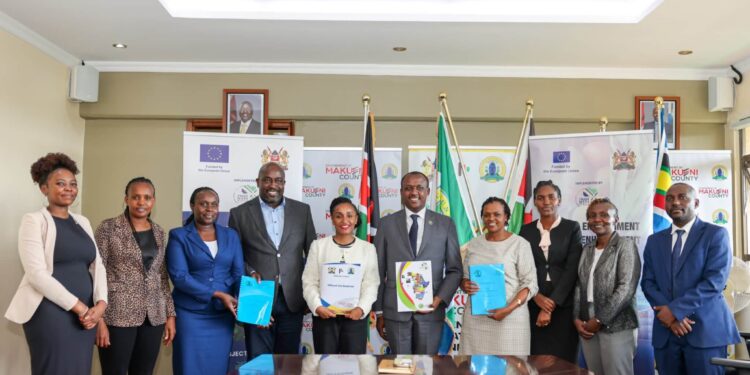Makueni County has signed a Sh1.1 billion agreement with TradeMark Africa to establish a state-of-the-art Export Supply Hub, a move aimed at reducing post-harvest losses and unlocking global markets for farmers in the region. The formal signing of the Memorandum of Understanding (MoU) took place on Monday, with Governor Mutula Kilonzo Jr. and TradeMark Africa Country Director Lillian Mwai officiating the deal. The partnership is funded under the EU-backed Business Environment and Export Enhancement Programme and is poised to redefine horticultural exports in Kenya.
The new Export Supply Hub, to be developed on land provided by the County Government, is a critical milestone for Makueni, a county that produces approximately 245,000 metric tonnes of mangoes each year. Nearly half of this produce is typically lost due to limited access to markets and inadequate storage. The Hub is expected to reverse this trend by aggregating, processing, cold storing, and packaging fruits and vegetables to meet international standards, particularly for markets in the European Union.
Beyond mangoes, Makueni is increasingly recognized for its avocado and French bean production. These crops hold significant potential in export markets, but farmers have faced challenges meeting strict quality requirements. The Export Supply Hub aims to bridge that gap through modern infrastructure and robust traceability systems. These systems will allow international buyers to verify the origin and handling of produce, building confidence and increasing market opportunities.
Governor Kilonzo hailed the agreement as a strategic investment in Makueni’s economic future. He emphasized that agriculture is the backbone of the county and that the Hub represents a tangible step toward transforming that foundation into a globally competitive engine. He noted that the facility will not only help reduce waste but will also create jobs, raise farmer incomes, and strengthen the county’s presence in the global horticultural value chain.
The facility will feature cold storage units, grading and sorting lines, packaging equipment, and digital systems for end-to-end product traceability. It will also be connected to the Standard Gauge Railway through an integrated cargo handling system. This connection will ensure faster, more efficient, and environmentally friendly transportation of fresh produce to export destinations.
TradeMark Africa Country Director Lillian Mwai described the initiative as more than a commercial venture. She framed it as a commitment to resilience, sustainability, and competitiveness, especially for smallholder farmers who have traditionally been left out of formal export systems. She added that the Hub would provide a structured path for these farmers to scale up and meet international quality benchmarks.
The MoU also includes a strong emphasis on capacity building. Farmers will be trained in improved farming techniques, post-harvest handling, and value addition practices. By equipping them with the knowledge and tools to meet export standards, the programme ensures that the benefits of the Hub are inclusive and sustainable. This farmer-centered approach is critical for building a supply chain that is not only productive but also reliable and compliant with international standards.
In the short term, the Export Supply Hub is expected to generate employment opportunities in logistics, processing, inspection, and packaging. It will also enhance local economies through increased trade volumes and better price realization for farm produce. In the long term, the initiative is poised to attract private investment, establish Makueni as a model for export readiness, and contribute significantly to Kenya’s national export earnings.
The facility will offer on-site inspection and certification services, streamlining the process of meeting export protocols. This will remove barriers that have often discouraged small producers from entering global markets. Aggregation centers across Makueni and neighboring counties such as Machakos, Kajiado, and Taita-Taveta will supply the Hub, ensuring a consistent flow of high-quality produce.
Kenya earned about 1.06 billion US dollars from horticulture exports in 2024, with vegetables, fruits, and cut flowers making up the majority of that value. The addition of a well-coordinated facility like the Makueni Export Supply Hub is likely to increase both the volume and quality of exports, further strengthening Kenya’s position as a key agricultural exporter.
The signing ceremony was attended by senior county officials, including CECM for Agriculture Joyce Mutua, Chief Officers Dr. Victoria Kyalo and Japheth Kiminza, County Solicitor Jennifer Kyumwa, and representatives from East Africa Market Development Associates. Their presence underscored the wide-ranging institutional support behind the initiative.
Ultimately, the Export Supply Hub is more than an infrastructure project. It is a vision for how smallholder farmers can become global suppliers, how counties can lead innovation in trade facilitation, and how Kenya can build an agricultural economy that delivers both prosperity and resilience. Through strategic partnerships and smart investments, Makueni is setting a powerful example for counties across the country.
Kenya’s foreign exchange reserves have climbed to a historic high of nearly $10.59 billion, according to the latest financial markets bulletin released by the Central Bank of Kenya...
Read moreDetails









